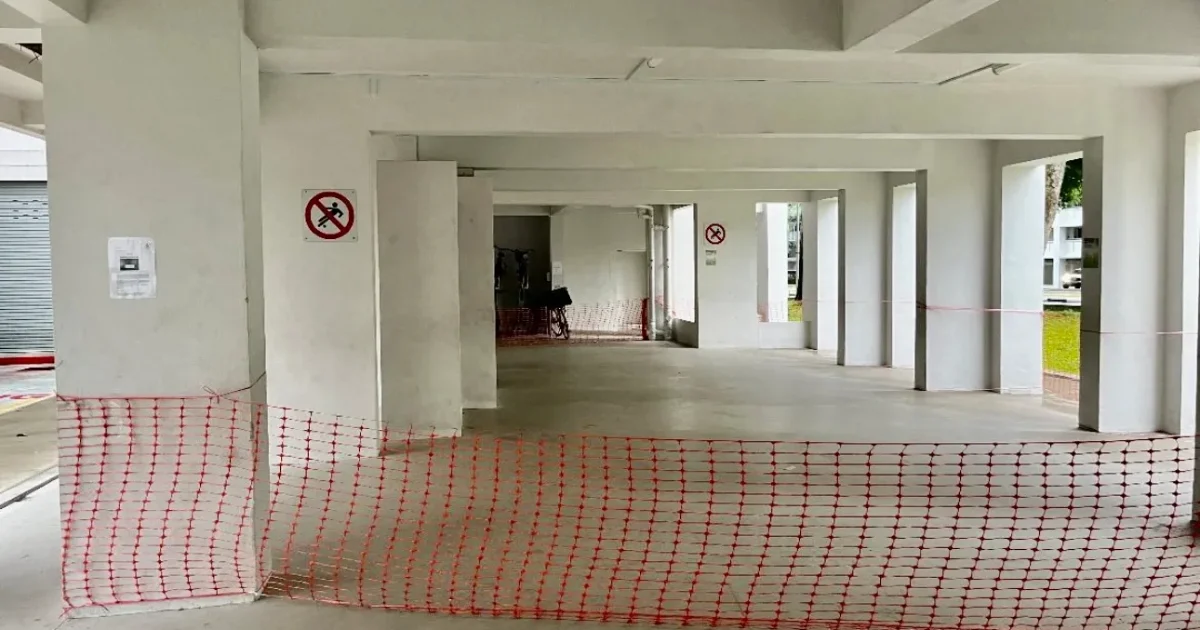Remember when the void deck of a public housing block in Woodlands was partially closed off to stop young footballers from playing in November last year?
Sembawang Town Council decided to take this action to address noise complaints from residents and to control ball-playing.
The issue gained even more attention when an unnamed Block 638 Woodlands Ring Road resident reached out to The Monitor, expressing their frustration with the town council’s decision to block off a significant portion of the void deck due to children playing football there.
In the past, children used to be able to freely hang out in public spaces and enjoy playing football with friends. However, they may now have fewer opportunities to do so as authorities are intervening with common spaces.
Minister of State Explains Why Agencies Have to Close Off Void Decks or Street Soccer Courts
In response to concerns about disputes over common spaces in residential estates, Minister of State for National Development, Associate Professor Muhammad Faishal Ibrahim, stated in Parliament on Tuesday (9 January 2024) that town councils and relevant agencies may step in directly if parties involved are unwilling to compromise.
Faishal emphasised that while some interventions may seem strict, they are necessary to strike a balance between the interests of all residents.
He also pointed out that this direct intervention is essential to create a harmonious living environment for everyone.

His remarks were made in response to an announcement by Nominated Member of Parliament, Dr Syed Harun Alhabsyi, which focused on fostering social cohesion through common spaces in residential areas.
This discussion arises in light of recent incidents where certain common areas in Singapore were temporarily closed and barricaded due to residents’ complaints.
Void Deck and Street Football Court Closed Off
In November 2023, the Sembawang Town Council took measures to cordon off a void deck in a HDB block in Woodlands to prevent ball-playing activities.
This action was prompted by complaints from residents about the “noise nuisance” created by school children engaging in activities such as “kicking balls and shouting loudly” in the area.

Similarly, the East Coast Town Council also decided to temporarily close a street football court in Bedok North about a month later.
In a Facebook post, the town council explained their decision, stating that the issues associated with the court’s misuse extended beyond just noise problems.
These additional concerns included instances of individuals urinating in public areas and engaging in heated disputes with residents.
Singapore to Find Better Solutions for Common Spaces in Residential Estates
Addressing the topic on Tuesday, Dr Syed said that Singapore has room for improvement in finding mutually beneficial solutions for common spaces.
He emphasised the potential for these spaces in residential areas to host a wide range of activities that engage society.
While acknowledging the complaints and disputes at the grassroots level, he pointed out that closing common recreational areas or limiting spontaneity in spaces intended for “legitimate” interests like sports could raise concerns regarding social cohesion.
Dr Syed proposed that Singapore should proactively address challenges through thoughtful design.
For instance, better noise insulation strategies for lower floors could be explored if noise levels are a concern.
Additionally, he suggested that play areas could be better delineated and designed to enhance safety for passers-by.
Continued Policy Support for Everyday Activities
He also stressed the importance of continued policy support for everyday spontaneous activities. This support should be coupled with a considerate approach to using common spaces, fostering trust and responsibility among residents.
Dr Syed outlined the approach, including considerations of when and where specific activities are permitted, potential modifications to make certain games more suitable for void decks or common areas, and identifying specific “no-go” areas for particular activities.
Faishal acknowledged that conflicts occasionally arise when using common spaces, and it’s necessary to strike a balance between the interests of various groups.
He added that residents seeking these spaces must apply for permission from town councils, which may not always be ideal for everyone.
He also pointed out that the Housing Board plans estates and towns to incorporate common spaces that maximise social interaction and support community building while catering to diverse needs.
For example, in new HDB developments, residential blocks feature community living rooms on the community deck, providing a relaxed space for neighbours to gather and host small-group activities.




